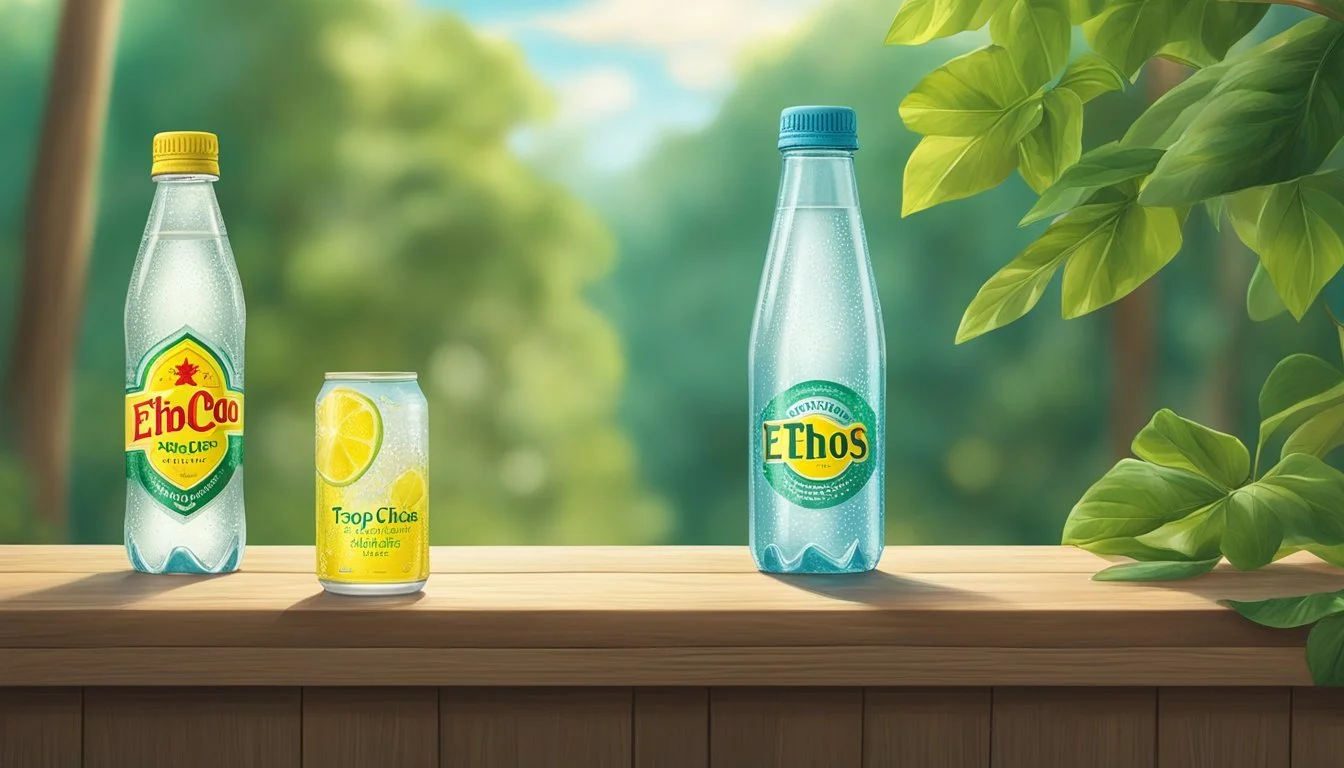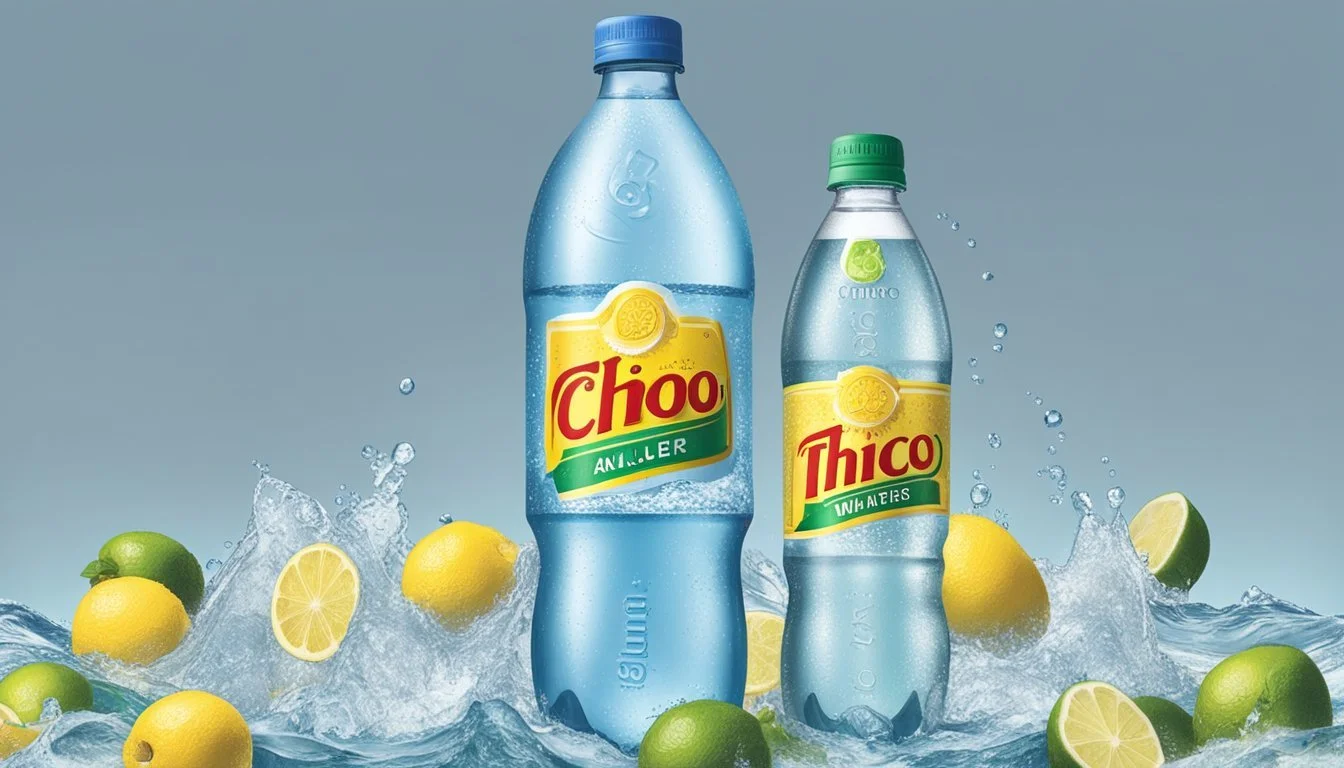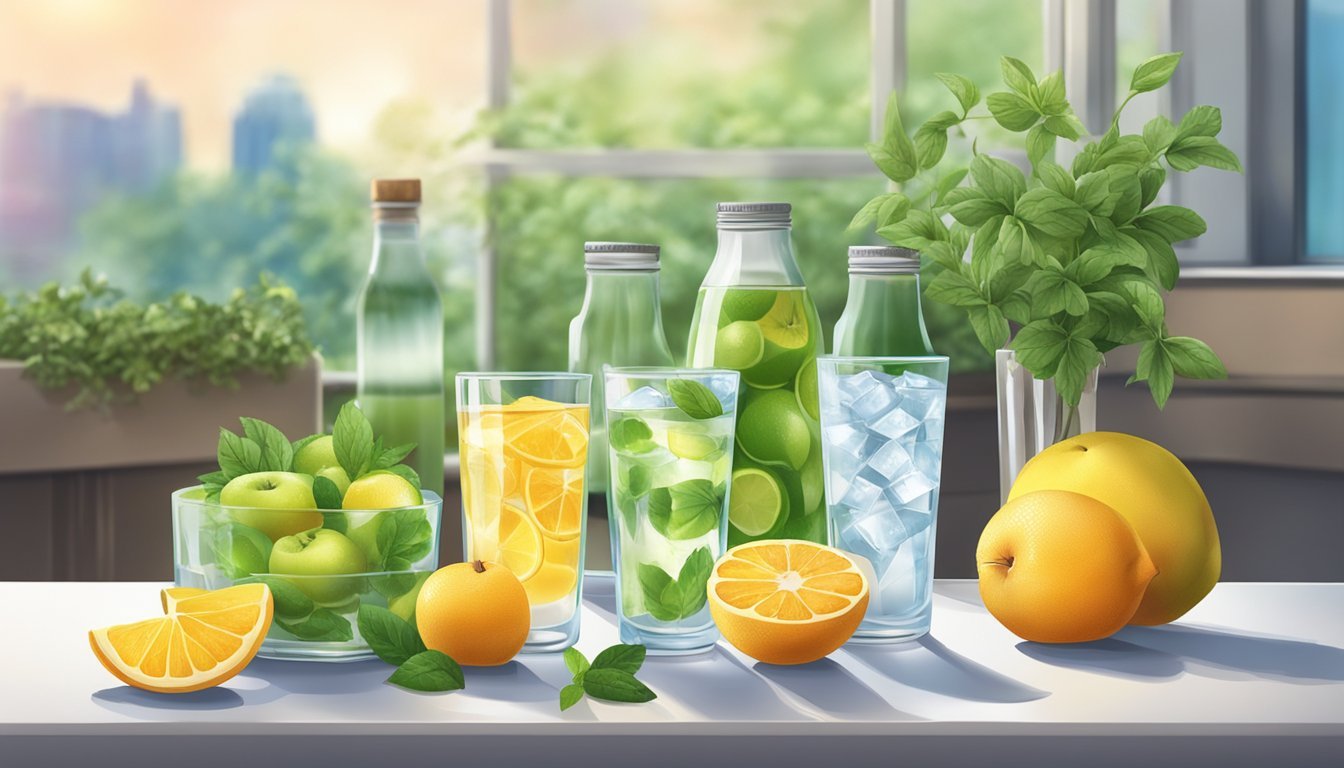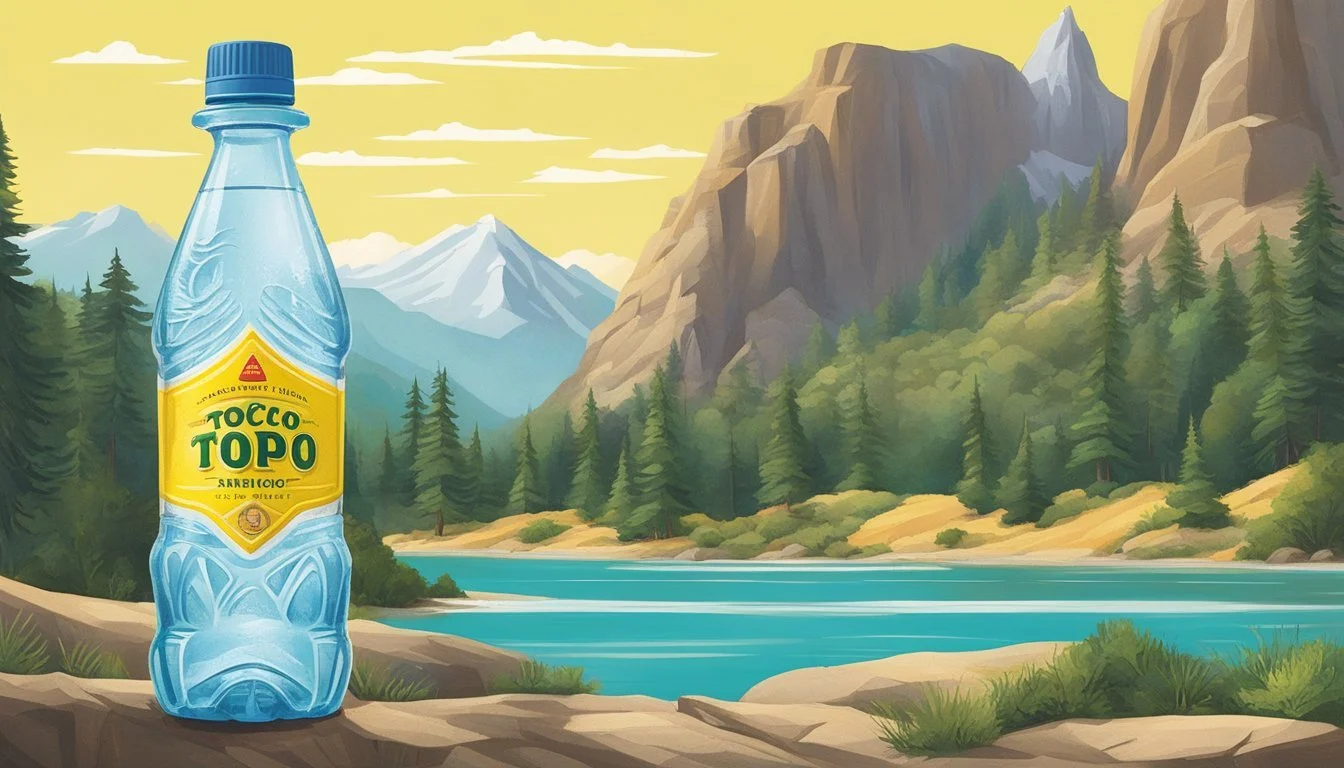Ethos vs. Topo Chico
Comparing Quality and Taste in Bottled Water Brands
In the world of bottled water, two brands often stand out for their distinct appeal: Ethos and Topo Chico. Ethos Water, with its mission-driven promise, donates a portion of each sale to humanitarian water programs, coupling hydration with social impact. Meanwhile, Topo Chico, a sparkling mineral water sourced from Monterrey, Mexico, has a century-old legacy, known for its crisp effervescence and iconic glass bottles that have garnered a loyal following.
The debate between Ethos and Topo Chico extends beyond taste and social responsibility. Consumers weigh the source, mineral content, environmental impact, and even the cultural significance of their water choices. Ethos boasts a philanthropic angle that resonates with socially conscious drinkers, while Topo Chico's nostalgic allure and distinct texture cater to those looking for a more indulgent experience.
This comparison taps into a deeper narrative of personal values and preferences influencing consumer behavior. As bottled water becomes more than a mere commodity but a lifestyle choice, Ethos and Topo Chico emerge as representatives of divergent but equally compelling narratives within the beverage industry. They offer contrasting pleasures—the satisfaction of contributing to a social cause versus the tactile joy of carbonated refreshment—each holding its own in the crowded marketplace.
History and Origin
In the realm of bottled water, the tales behind the brands are as distinct as their tastes. With Topo Chico's storied origins rooting back to the slopes of Monterrey, Mexico, history plays a crucial role in its identity and evolution.
The Legend of Topo Chico
Topo Chico's narrative begins with an ancient legend involving an Aztec princess who was cured by the restorative waters from the springs at Cerro del Topo Chico, a mountain near Monterrey, Mexico. The company stakes its claim that Topo Chico was first bottled in 1895 at this location, tapping into the source that was reputed for its healing properties.
Expanding Beyond Monterrey, Mexico
Initially popular within northern Mexico, particularly Monterrey, Topo Chico began extending its reach. The brand's bottled mineral water quickly found favor, leading to a broader distribution across Mexico. By the 1920s, Topo Chico was gaining international recognition, spurring growth and expansion from its Monterrey base.
Product Overview
Choosing between bottled water brands often comes down to more than just taste—it's about the source, mineral content, and packaging materials. This section provides an overview of Topo Chico Mineral Water and Ethos Bottled Water, focusing on their individual characteristics.
Topo Chico Mineral Water
Topo Chico has its origins in Monterrey, Mexico, and is renowned for being a naturally carbonated mineral water. It is extracted from the Cerro del Topo Chico spring, offering a distinct taste derived from its unique mineral composition. This mineral water is available in glass bottles and known for its sparkling water variety, which is popular for its crisp and refreshing effervescence.
Mineral Content: Features a blend of minerals that contribute to its signature flavor.
Packaging Options: Primarily sold in transparent glass bottles for preservation of taste and quality.
Ethos Bottled Water
In contrast, Ethos Bottled Water is designed with a socially responsible mission in mind, aiming to help provide access to clean water in developing countries. Ethos sources its water from various springs and utilizes a meticulous filtration process to ensure purity. The company is also dedicated to sustainability, represented by its choice of packaging.
Filtration: Undergoes a rigorous filtration process to achieve purity and clarity.
Packaging Materials: Primarily packaged in plastic bottles, with a commitment to reduce plastics and consider environmentally conscious materials like aluminum or glass bottles in the future.
Both brands fulfill the role of satisfying hydration with their own unique attributes and ethical considerations, offering consumers a choice between classic mineral enriched refreshment and socially responsible consumption.
Nutritional and Mineral Composition
When comparing Ethos and Topo Chico bottled waters, their nutritional and mineral makeup is essential, focusing on calcium, magnesium, sodium, potassium, and electrolyte contents. Both waters offer distinct mineral profiles, providing various health benefits attributed to these nutrients.
Analyzing Mineral Levels
Ethos Water, a brand often sold in coffee shops and convenience stores, does not typically advertise a unique mineral composition, since it is purified water, often with minerals added for taste. In contrast, Topo Chico, a sparkling mineral water sourced from Monterrey, Mexico, boasts naturally occurring minerals resulting from its underground volcanic source. According to a water analysis report referenced in the search results, Topo Chico mineral water contains notable levels of:
Calcium: Beneficial for bone health and cardiovascular function.
Magnesium: Crucial for muscle and nerve function, among other physiological processes.
Sodium: Plays a key role in fluid balance and nerve transmission.
Potassium: Essential for normal cell function, including regulating heartbeat and muscle function.
Magnesium and calcium are specifically influential in electrolyte balance, crucial for hydration and muscle performance.
Comparing Health Benefits
The health benefits of the minerals found in Topo Chico are significant. For example, the calcium in mineral water can contribute to the maintenance of healthy bones and teeth. Magnesium assists in over 300 bio-enzymatic processes that keep the body functioning properly. Inclusion of sodium and potassium aids in the balance of fluids within the body, which is important for daily hydration and physical activity.
Both Ethos and Topo Chico can hydrate, but Topo Chico's natural electrolytes and mineral content might offer an edge in terms of added nutritional benefit. Its carbonation also aids digestion. It's noteworthy that while Topo Chico may contain minerals and electrolytes that are important for bodily functions, excessive intake of sodium should be monitored, particularly by individuals with specific health considerations regarding sodium intake.
Taste Profile
When considering the taste profile of bottled water, one often examines the nuanced flavors and sensory experiences each brand provides. Both Topo Chico and Ethos have distinct taste profiles that cater to different preferences.
Flavor Influences in Topo Chico
Topo Chico is known for its bold carbonation and a hint of mineral taste, providing a sharp, invigorating sensation. Characterized by a clean and crisp finish, this mineral water can offer a bright and refreshing feel. Notably, some Topo Chico varieties include a twist of lime or grapefruit, adding a subtle yet distinctive citrus flavor to its profile. The natural mineral composition contributes to its signature taste, often described as less earthy compared to other mineral waters due to its relatively lower mineral content.
Carbonation: Bold and sharp
Mineral Taste: Clean, subdued earthiness
Citrus Twists: Available in lime and grapefruit variants
Sensory Experience with Ethos
Ethos Water presents a more mellow and smooth taste, lacking the intense carbonation of Topo Chico. These waters are typically favored for their purity and simplicity, hence there is less of a focus on additional flavors like lime or grapefruit. Ethos provides a straightforward hydration experience, appealing to those who prefer unadulterated and soft tasting water. It may lack the complexity of Topo Chico's flavor profile but is appreciated for its clean and neutral taste.
Carbonation: None to low
Flavor Additions: None, emphasis on natural purity
Taste: Smooth and soft, neutral palate
Environmental Impact and Sustainability
When examining Ethos and Topo Chico bottled waters, their environmental impacts and sustainability practices come into sharp focus. Key considerations involve how each brand handles packaging and recycling, as well as the management of their water sources, to ensure long-term sustainability.
Packaging and Recycling Practices
Ethos Water, packaged in plastic bottles, has established itself as a socially responsible brand. While plastic is often criticized for its environmental footprint, Ethos has shown commitment to supporting water, sanitation, and hygiene programs—a move that echoes their broader ethical stance.
Topo Chico, traditionally bottled in glass, has been navigating the environmental pressures of its packaging choices. Glass, while recyclable, is heavier and can result in higher transportation emissions. Consumer Reports indicate that Topo Chico has also ventured into recycling initiatives, addressing the challenges involved with glass to reassure environmentally-conscious consumers of their commitment to sustainability.
Water Source Management
Ethos sources its water domestically, striving for clean water accessibility. They demonstrate a proactive approach to water source management by investing in community water programs, though details on their specific source management practices are less frequently disclosed.
Topo Chico draws its fame from the Mauna Loa Volcano water source, abundant in minerals. The company is tasked with balancing the allure of this unique source while managing environmental impacts. There is, however, limited public information on the extent of Topo Chico's water source sustainability efforts or if they have sought a carbon neutral certification—factors crucial for judgment on their environmental impact.
Branding and Market Presence
In the landscape of bottled waters, branding and market presence play pivotal roles in the success of a product. Ethos and Topo Chico are distinct examples of how a company can leverage these elements to build a supportive consumer base.
Advertising Strategies
Ethos Water employs a socially responsible marketing approach, highlighting that a portion of its sales goes towards global humanitarian water programs. This strategy aligns with the lifestyle preferences of socially-conscious consumers, who feel they are contributing to a worthy cause with their purchase.
In contrast, Topo Chico, which has been acquired by Coca-Cola for $220 million in 2017, taps into the trend of authenticity and heritage in its advertising. The brand emphasizes its longstanding tradition of bottling at the same source since 1895, appealing to consumers who value legacy and authenticity in the products they choose.
Consumer Perceptions
Consumer Reports and similar entities have not only rated these products for their taste but also for the ethos they embody. Ethos Water is often associated with a humanitarian mission, which resonates with a segment of consumers who prioritize ethical consumption. Its presence in Starbucks stores further solidifies its market presence among cafe-goers and equates to increased sales.
Topo Chico has developed a cult following, especially among the millennial demographic, owing to its unique taste and effervescence. Its market presence has seen a significant boost in U.S. sales, growing by a notable 35 percent over recent years. Coca-Cola's backing provides a robust distribution network that amplifies Topo Chico's visibility. The brand leverages digital activations, like augmented reality, to connect with U.S Hispanics and mainstream millennials, increasing its lifestyle appeal among these groups.
Use in Lifestyle and Mixology
For those seeking hydration or a sophisticated beverage experience, both Ethos and Topo Chico serve distinct roles in lifestyle choices and mixology.
From Drinking Water to Cocktail Mixer
Ethos Water is often praised for its philanthropic ethos, providing clean drinking water to communities in need. It typically serves as a straightforward means for hydration rather than a mixer. Consumers generally prefer it chilled, consumed on its own due to its clean taste and dedication to social responsibility.
In contrast, the effervescent nature of Topo Chico makes it a versatile player in the realm of mixology. Its lively carbonation enhances the sensory experience of a variety of cocktails. Bartenders frequently reach for Topo Chico when creating:
Ranch Water: A simple concoction comprising tequila, lime juice, and Topo Chico.
Hard Seltzers: Topo Chico itself has entered the hard seltzer market, infusing their mineral water with alcohol and flavors.
Popular Drinks and Recipes
A staple in mixology, Topo Chico can be found in a wealth of popular drink recipes:
Classic Paloma: Topo Chico, a quality tequila, freshly squeezed lime juice, and a pinch of salt.
Soda Alternatives: It's a healthier stand-in for traditional sodas in cocktails, delivering fizz without added sugars or artificial ingredients.
Recipes and Pairings:
Cocktail Name Ingredients Ranch Water 1 part Tequila, 2 parts Topo Chico, Lime Juice to taste Paloma 2 parts Grapefruit Soda or Juice, 1 part Tequila, Topo Chico to top up, Lime Juice
Whether mixed in a cocktail or sipped solo, these waters find their place within a broad spectrum of lifestyle preferences from daily hydration to social gatherings.
Health Considerations and Safety
In the scope of bottled water safety, the presence of chemicals and adherence to regulatory standards are pivotal. This section addresses the health considerations and safety of Ethos and Topo Chico bottled waters with a focus on contaminants and compliance with government regulations.
Understanding PFAS Chemicals
Per- and polyfluoroalkyl substances (PFAS) are a group of man-made chemicals that include PFOA, PFOS, GenX, and many other substances. They are often referred to as "forever chemicals" because they do not break down and can accumulate over time in the environment and human body, leading to potential adverse health effects, including increased risk of cancer and other illnesses.
Ethos Water: This brand is typically filtered and undergoes various purification processes to remove contaminants and reduce the levels of substances such as chlorine. The level of PFAS in Ethos Water is typically not highlighted in publicly available sources, meaning detailed information may need to be obtained directly from the company or through third-party testing.
Topo Chico: As per recent testing reported by Consumer Reports, Topo Chico has reduced its levels of PFAS by more than half. Yet, even with reductions, the presence of PFAS may still be of concern to consumers seeking the cleanest drinking water possible.
Government Regulations and Standards
The Environmental Protection Agency (EPA) and the Food and Drug Administration (FDA) are key agencies that set standards for drinking and bottled water quality in the United States.
EPA: Oversee tap water safety, establishing legal limits on the levels of certain contaminants in drinking water. While PFAS are currently not regulated, the EPA has announced a roadmap to address these contaminants and is considering setting enforceable limits on PFAS in tap water.
FDA: Regulates bottled water and requires manufacturers to monitor for contaminants. Standards for bottled water must be as protective of public health as EPA’s standards for tap water.
Both Ethos and Topo Chico are subject to these regulations and must comply with FDA standards, which include limits on contaminants such as PFAS, chlorine, and maintaining acceptable pH levels. In practice, the two brands strive to ensure that their bottled water products are safe for consumption and meet, if not exceed, the current regulatory requirements.
Consumer Insights
When comparing Ethos and Topo Chico bottled waters, consumers primarily consider satisfaction levels and price sensitivity, alongside the perceived value each brand offers.
Satisfaction Levels
Consumers often express their satisfaction with bottled water brands based on factors like taste, purity, and health benefits. Topo Chico, identified for its unique mineral profile, historically faced criticism for PFAS levels; however, more recent efforts indicate a reduction in these chemicals. Ethos Water, while lesser-known than Topo Chico, markets itself as an ethical choice, with a pledge to contribute to humanitarian water programs, appealing to socially conscious consumers.
In the realm of satisfaction, other brands also play a role. Fiji and Evian are frequently cited for their natural purity and taste. Smartwater, with its added electrolytes, is often selected for perceived health benefits. Essentia, boasting a high pH, competes on the health front, too, with consumers seeking alkaline diets expressing preference for it.
Price Sensitivity and Value Perception
Price is an influential factor in consumer decision-making. Here is how some of the brands are generally positioned in terms of price:
Topo Chico: Mid-range
Ethos: Mid to high-range (considering its charitable pledge)
Other brands in the market have varying price points:
Premium options like Voss and Acqua Panna cater to an upscale market segment.
Brands like Dasani, Aquafina, and Pure Life by Nestlé are perceived as more cost-effective alternatives, commonly available at major retailers like Amazon.
Consumers sensitive to price may lean toward value brands such as Pure Life or Dasani, while others may find the cost of Ethos justifiable for its social impact. Specialty waters like Topo Chico offer distinct taste experiences, which might justify their prices in the eyes of certain consumer segments.
Cultural and Historical Significance
The historical roots and cultural impact of water brands like Ethos and Topo Chico are deeply entwined with their origins and the narratives they carry, influencing their reception by consumers worldwide.
Historical Significance of Water Brands
Topo Chico has a distinguished history, with its origins tracing back to 1895 in Monterrey, Mexico. It is named after the Cerro del Topo Chico mountain and has been associated with healing powers as early as the Aztec era, where it was reputedly used by priests and nobility to alleviate various ailments. The brand's history claims its water was sought after for qualities that made it suitable for aiding digestion and serving as a cure for hangovers.
On the other hand, Ethos Water is a much newer brand, which was established in 2001. While it may not share the same lengthy historical narrative as Topo Chico, Ethos has positioned itself with a socially responsible angle, pledging to provide children with access to clean water, thus creating its own legacy.
Cultural References and Anecdotes
The cultural significance of Topo Chico is evidenced by its wide use in beverages and everyday life, particularly in regions close to its Mexican roots. The water's salty and thirst-quenching properties make it a favorite mixer in cocktails like the "Ranch Water," which combines Topo Chico with tequila and lime juice, cementing its role in contemporary drinking traditions and ceremonies.
Ethos Water was conceived with a mission beyond mere hydration - to contribute to humanitarian causes. For every bottle sold, a portion of the proceeds goes to support water, sanitation, and hygiene education programs in developing countries, transforming consumer purchases into acts of charity. Its impact is cultural in a philanthropic sense, where the purchase is often seen as a modern-day ceremony of giving back, aligning with values of global responsibility and tradition.








